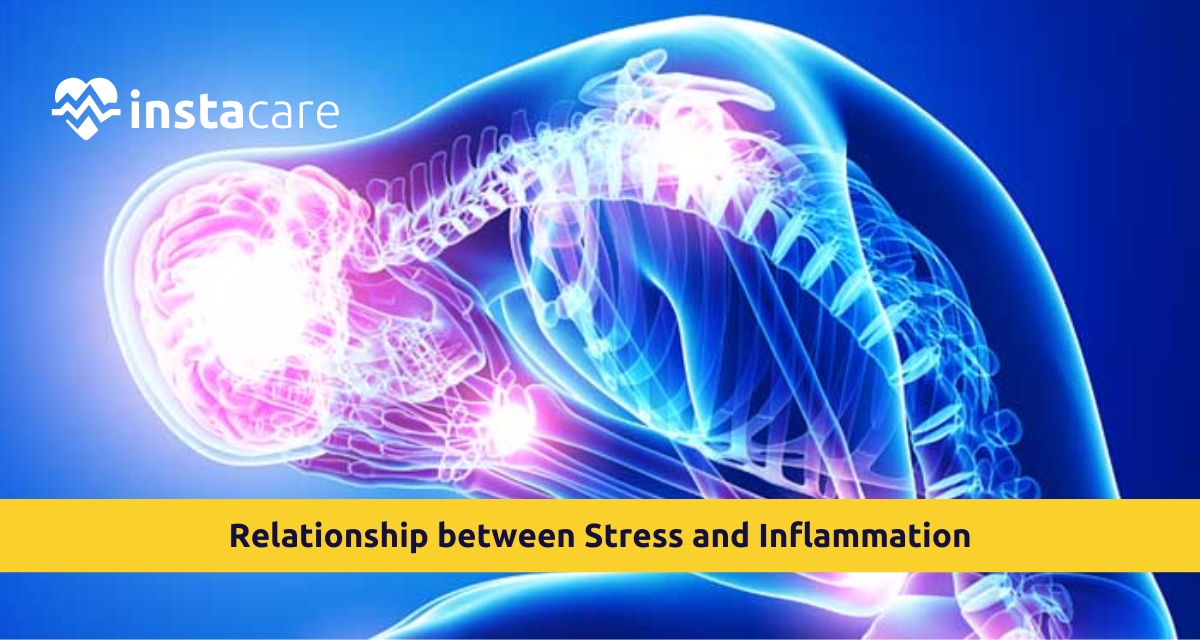Many people deal with constant stress in their everyday lives these days. Most researchers think stress impacts mental well-being yet recent research shows it directly affects our physical health particularly our inflammation levels. Stress joins the list of major disease triggers that can result in damaging inflammatory conditions for your body. This section examines how small changes in stress affect inflammation biology which leads to health problems.
Understanding Stress
When your body perceives threats or difficulties it responds
by activating the "fight or flight" mechanism. When our body detects
threats it sends hormones to start the preparation for danger. Small amounts of
stress help us but too much stress over time damages our health.
Types of Stress
- Acute Stress: Regular daily stressors create problems when
you must complete tasks before deadlines or speak before an audience.
- Chronic Stress: Stress that persists over time caused by problems like work stress, financial issues, or relationship problems.
Impact of Stress on the Body
Chronic stress can cause many physical and psychological
health problems, including:
- Anxiety and depression
- Cardiovascular diseases
- Gastrointestinal problems
- Weakened immune system
What is Inflammation?
When you experience an injury or infection your immune
system sends this defense response. The immune system creates this response to
protect damaged areas through visible signs of redness and swelling along with
body temperature changes and discomfort. Prolonged inflammation creates medical
conditions.
Types of Inflammation
- Acute Inflammation: Your body's defense system reacts
briefly to wounds or diseases through inflammation which ends when you recover
from the issue.
- Chronic Inflammation: When present for an extended expanse of time from weeks to decades it relates to many long-term health problems.
Health Effects Of Chronic Inflammation
There are many health conditions that have been linked to chronic inflammation, including:
- Cardiovascular disease
- Diabetes
- Autoimmune diseases
- Cancer
View More: How Does Emotional Stress Affect Your Health
Link between Stress and Inflammation
Biological Mechanisms
The association between stress and inflammation is complex
and multifaceted through the following biological mechanisms: Stress hormones
stay active long-term and force cortisol levels to stay raised. At low levels
cortisol controls inflammation by enhancing its anti-inflammatory effects while
at high doses it harms by adding to inflammatory activity.
Activation of the Immune System
When stressed your
sympathetic nervous system turns on to release hormones like adrenaline into
your system. The body produces more CRP and IL-6 markers in its immune reaction
after hormone stimulation.
Lifestyle Factors
Extended stress activates a natural
reaction that causes most people to make unhealthful daily selections starting
with what they eat and how they move their body. When added to poor lifestyle
habits inflammation becomes more severe and increases the risk of developing
chronic diseases.
Stress and inflammatory Diseases
Cardiovascular Disease
Our body develops cardiovascular disease faster when we have
stress for long periods. Inflammation becomes core to understanding this
connection. Heart disease risk grows when CRP levels rise in the body.
Excessive inflammation produced by stress often leads to the development of
atherosclerosis which then causes plaque to accumulate inside the arteries.
Autoimmune Disorders
The body's immune system attacks healthy tissue as part of
chronic inflammation in patients with rheumatoid arthritis and lupus.
Scientists linked stress to its role in triggering stronger inflammatory
reactions that made autoimmune disorders worse. Research shows that learning to
handle stress reduces health problems linked to autoimmune condition
inflammation.
Metabolic Syndrome
The collection of health issues obesity, hypertension, and
insulin resistance shows strong links to persistent inflammation. Your body
will more likely develop these metabolic disorders if you don't manage stress
effectively.
Managing Both Stress and Inflammation Levels
Effective stress handling approaches lead to successful inflammation reduction. Some such stress reduction techniques are:
- Mindfulness and Meditation: People who practice mindfulness
meditation feel less stressed and boost their cells' natural
inflammation-fighting process. Research shows practice of mindfulness lowers
inflammatory signal markers in the laboratory.
- Physical Activity: Physical workouts generate body tension
which helps reduce stress and fights cell inflammation. When you exercise your
body releases hormones that control stress and produces endorphins which raise
your happiness level.
- Healthy Diet: Eating more whole foods like vegetables fruits
whole grains and healthy fats helps decrease inflammation in our bodies. Eating
foods rich in antioxidants like berries and leafy greens reduces how hard your
body works against stress.
- Good sleep helps us handle stress better. Lack of good sleep makes stress and inflammation more common in our body systems. Sleep routines help us achieve better sleep quality.
Conclusion
Understanding the link between stress and inflammation
matters a lot for our health. Chronic stress makes your body respond with
prolonged inflammation that causes health problems over time. Recognizing that
stress causes persistent inflammation demonstrates why you need to control your
stress levels to stay healthy. Stress management alongside healthy habits
enable us to reduce inflammation and achieve better health without long-term
diseases. Stress management steps will create better health connections between
mental and physical wellness to support a healthier population.
Please book an appointment with the best Psychologist in Lahore, Karachi, Islamabad, and all major cities of Pakistan through Instacare, or call our helpline at 03171777509 to find a verified doctor for your disease.












